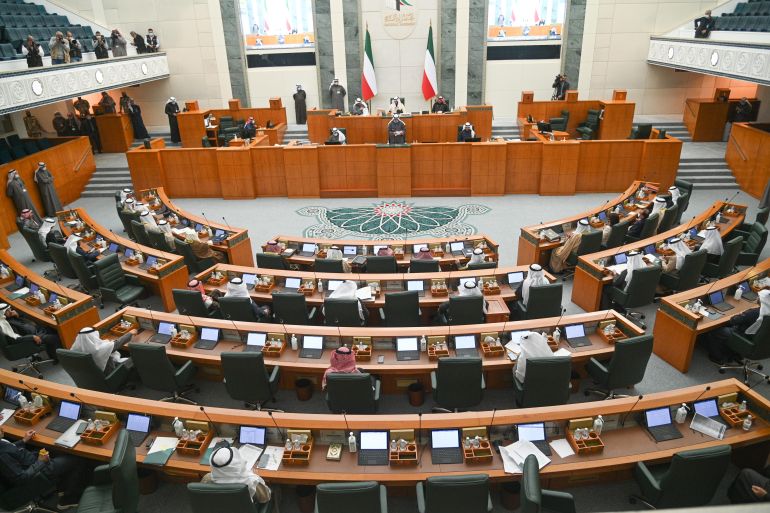What to know about Kuwait’s parliamentary elections
Authorities will not meddle in parliamentary election, crown prince says, which 796,000 citizens are eligible to vote for.

People in Kuwaiti are heading to the polls to vote in parliamentary elections for the second time in less than two years.
The latest parliament was dissolved in June.
Keep reading
list of 3 itemsSaudi, Kuwait to develop gas field despite Iran condemnation
OPEC taps Kuwait’s Haitham al-Ghais as its next public face
An early election was then called, after a months-long deadlock between opposition legislators and the government.
Nearly 796,000 Kuwaitis across five constituencies are eligible to vote at polling stations, which will be open for 12 hours from 8am (05:00 GMT) on Thursday. Official results are expected to be announced on Friday.
Kuwait has held 18 elections since 1962. The parliament, known as the National Assembly, has a four-year mandate, but parliamentary elections are often held more regularly. Much power effectively remains in the hands of Kuwait’s ruling family and the emir who appoints the government.
Why was the National Assembly dissolved?
- The previous government, under former Prime Minister Sheikh Sabah Al-Khaled Al-Sabah, had faced several months of political feuding and tension with parliament.
- When he dissolved parliament via a royal decree, Crown Prince Sheikh Meshal said Kuwait’s leadership would rely on the people to elect a parliament after the previous assembly behaved in “practices and behaviours that threaten national unity” due to the “overlap between the legislative and executive powers”.
- He also said the domestic political scene was being “torn by disagreement and personal interests”, to the detriment of the country.
How do the candidates compete for the vote?
- All candidates run as independents since Kuwait outlaws political parties.
- Because of the absence of political parties, political analyst Abdelrahim Hussein argues that the people will not vote based on a political programme or manifesto. “None of the candidates ran a campaign that spoke about their views on an economic project, or the housing issue, or the hot topics that surround our region,” Hussein told Al Jazeera.
- People often vote along sectarian and tribal lines.
- Areej Hamada, a Kuwaiti lawyer, told Al Jazeera the effectiveness of the Kuwaiti parliament has “declined” due to sectarian or tribal allegiances. “Unfortunately, voting is regarded along the familial, tribal, sectarian and friendship lines without giving attention to the electoral agendas of the candidates.”
Female representation
- Women represent 51.2 percent of the 795,920 voters, and earned the right to cast their ballot in 2005.
- However, parliament has been all male since the only woman MP, Safa al-Hashem, lost her seat in December 2020.
- Today, at least 22 women, including well-known television personality figure Fajed al-Saeed, are among the 305 candidates who are competing for the 50 elected seats in the National Assembly, which also includes an appointed cabinet.
- In addition to women’s rights issues, such as inheritance and property ownership, other topics include specifying term limits for the prime minister.
What makes this parliamentary election different?
- The election is set to be the most inclusive in recent history after longstanding opposition figures decided to end their 10-year boycott and run for election.
- The crown prince has also pledged not to meddle, saying: “We will not interfere in the people’s choices for their representatives, nor will we interfere with the choices of the next National Assembly in choosing its speaker or its committees.”
- “Parliament will be the master of its decisions and we will not be supporting one faction at the expense of another,” he added. “We will stand at the same distance from everyone.”
- The election will also mark the first time that the voting system takes place according to one’s civil ID, meaning that they can only vote in their respective constituencies, allowing for a fairer distribution of votes.